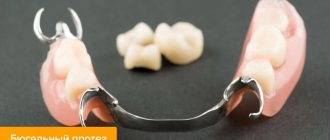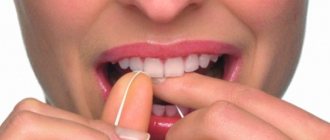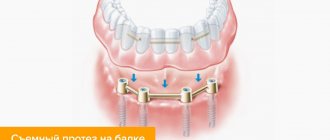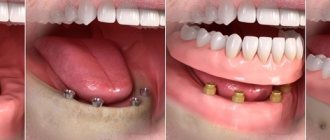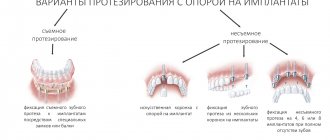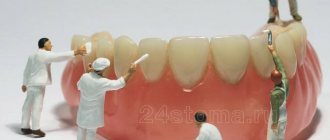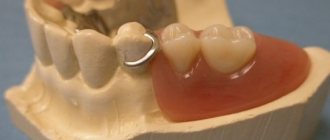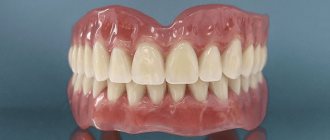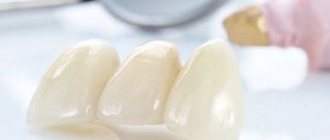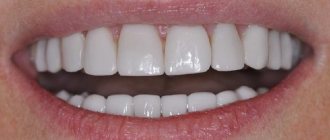Consultation with a doctor The main problem of people who have started using prostheses is their unreliable fixation. Even with the selection of the highest quality dentures, there is a possibility that the structure will move when talking or eating. This happens because removable dentures do not adhere well to the gums.
Solving this problem is not difficult. Today there are many products on the shelves for fixing dentures. They differ in the method of application, price and convenience. The most common among the products: powders, gels, creams, pads for fixing dentures.
Soak dentures overnight
Soak the dentures overnight for the first two weeks after making the denture; dentists recommend wearing the new denture almost all the time, without removing it, or removing it for a short period of time. However, after two weeks, the tissues of the prosthetic bed need regular rest - at least 6 hours a day.
Remember that most types of dentures must be kept moist to maintain their shape. When removing them for a long period, you need to place them in a water solution, or a special solution for soaking dentures (you can buy it at the pharmacy). Place the denture in water overnight. Do not keep dentures with metal elements in water that smells like chlorine - this may cause the metal parts of the denture to darken.
Important: remember that dentures can become deformed if they dry out or if you place them in hot water.
Getting used to removable dentures
As a rule, getting used to removable dentures takes some time. But after the “grinding in” period, a person already perceives the prosthesis as an integral and irreplaceable part of his body.
How long does it take to get used to dentures?
On average, the period of adaptation to dentures for a patient lasts thirty days. At first, dentures feel like a foreign body in the oral cavity, but this is quite natural, because a removable denture is an orthodontic structure. At first, removable dentures may even impair diction. This is especially difficult for people who, due to duty or other life circumstances, regularly communicate in foreign languages. But soon you will get used to it and your speech will be restored.
The presence of an orthodontic structure in the oral cavity initially disrupts the process of salivation and prevents a person from objectively assessing the taste and temperature properties of the food consumed. Also, during meals in the first month of wearing removable dentures, it may be difficult for a person to bite off solid food and chew a piece.
Caring for removable dentures also takes some getting used to. To help you remember, try posting reminders of what needs to be done. Over the course of some time, caring for removable dentures will become automatic.
But there is no need to worry and worry in all of the above cases. Typically, the patient’s symptoms of getting used to a removable denture disappear during the first week of wearing. Within a month, you will physically stop noticing the removable denture and will not consider it a foreign body. Moreover, most patients note that after an adjustment period they feel more comfortable with dentures in the mouth than without them.
How to quickly get used to removable dentures
The main condition for quickly getting used to removable dentures is their constant use despite some discomfort. It's worth it - it's better to wait one week and then enjoy a quality and comfortable life. There are several recommendations and tricks that will help the body go through the adaptation period faster.
During the adjustment period, before placing the denture in the oral cavity, moisten it with water or apply a special fixative to its surface. Practice putting on and taking off removable dentures first, so that later this action becomes mechanical. If you start to feel nauseous, suck on a small piece of candy by pressing your tongue against the roof of your mouth.
For up to two weeks, when you get used to the dentures, do not take them off even at night. They should only be removed to clean the mouth and the denture itself. Reading aloud for two hours in a quiet environment will again help “tune” your diction. This exercise restores the articulation of sounds in five to six days. Rinse your mouth with warm water about eight times a day and drink hot tea more often. Cut foods into small pieces before eating. It is better to chew food with your lateral teeth, both left and right at once. Eat more vegetables and fruits.
How to whiten dentures
Denture whitening may be required if you have not taken good care of your removable dentures for a long time, which has led to their darkening (due to the attachment of pigment plaque and tartar).
Whitening dentures using whitening toothpastes is highly not recommended, because... Such toothpastes have increased abrasiveness (due to which pigment plaque is removed). But the surface of the denture is much less hard and more susceptible to abrasion and scratches than tooth enamel, and therefore the use of whitening pastes will cause irreparable damage to the denture.
If whitening is still necessary, then it is better to take your dentures to a dental clinic for cleaning, or use special denture cleaning tablets at home. As an option, you can purchase an ultrasonic denture cleaner, which will allow you to get super cleaning and disinfection, much more effective than just using effervescent tablets.
Features of nylon prostheses
The base of nylon dentures is made of special dental nylon, on which artificial dental crowns are installed. Nylon is a flexible, lightweight, durable material, so prostheses made from it are quite comfortable to wear.
Prosthetic structures are smaller in size compared to dentures on an acrylic base. Almost invisible in the mouth due to the high transparency of the material and nylon (not metal) fixing clasps made of the same material as the base. Durable, thanks to the elasticity of nylon, the prosthesis cannot be broken. Lightweight, the low weight of the prosthesis eliminates unnecessary pressure on the gums. Installation does not require grinding of the supporting teeth; nylon clasps tightly grip them at the base. In addition, nylon is a hypoallergenic and safe material and does not contain any toxic compounds.
Chashchin Kirill Valerievich
Orthopedic dentist, 14 years of experience
Digital prosthetics. Aesthetic restorations with veneers with a lifetime guarantee. Total orthopedic rehabilitation in one day
More about the doctor
Modern methods of cleaning dentures
Ultrasonic bath High-quality care of removable dentures can be successfully carried out using special special ultrasonic baths. These baths not only allow you to thoroughly clean the denture, but also ensure that there is no tartar or pigment plaque on it, and therefore there will be no unpleasant odor from the denture.
Such a device for cleaning dentures can be successfully used for non-contact cleaning and disinfection of objects for any other purpose: children's things (for example, pacifiers, bottles, precious metals, etc.).
Indications for removal
Crowns are removed when necessary. The prosthesis can last about 10 years if the rules of care and oral hygiene are observed. After the expiration of the intended service life, it is advisable to replace the structure. Indications for replacing a dental product:
- Mechanical damage, cracks, chips.
- The occurrence of an inflammatory process under the prosthetic structure.
- Incorrect installation. Gaps between the device and the gum. Inconsistency of the design with the anatomical features of the patient’s jaws.
- Loosening and loss of the product due to destruction of the cement base.
- The patient’s desire to replace the prosthesis with a modern design.
If you experience discomfort, pain under the crown, bad breath, swelling and redness of the gums adjacent to the denture, you should immediately contact your dentist. This will prevent the development of complications.
Denture Cleaner
As we said above, you may need:
- The toothbrush must have soft bristles.
- Toothpaste must be low-abrasive (pastes for children under 6-7 years old), but instead of toothpaste, you can, in principle, use liquid soap.
- Effervescent tablets for cleaning dentures. Tablets for dentures or “KOREGA Bio” allow you to disinfect and clean the denture at home without purchasing an ultrasonic bath (but the quality of cleaning will be slightly lower). Denture cleaning tablets contain components that dissolve plaque and organic matter on the surface of the denture, and also disinfect the denture. Directions for use: Place one tablet along with the prosthesis in a glass of lukewarm water. After 10 minutes spent in the solution, the prosthesis will acquire a fresh and neat appearance, and will also undergo complete disinfection.
Cost: what it depends on
The price of nylon removable denture systems varies depending on the specific model. With complete edentia, the cost of the structure is 30-50 thousand rubles, when correcting partial edentia, the costs will be in the range of 15-40 thousand rubles, a fixed nylon prosthesis for 1-2 teeth will cost 12-15 thousand rubles.
The exact cost of a removable nylon denture can be found out at a consultation with an orthopedic dentist, who, after a diagnostic examination of the oral cavity, will indicate the exact amount required for prosthetics.
Own digital laboratory - speed and quality
The Center has a digital dental laboratory with a staff of experienced qualified dental technicians.
- Direct and immediate interaction between the orthopedist and the dental technician
- Highly accurate digital impressions without impression material errors
- Fast terms of prosthetics, no restrictions on the number of fittings
Advantages
Nylon dentures look very natural, do not put pressure on the gums, and the adaptation process is faster than with similar removable structures
- Aesthetics Look as natural as possible, identical in appearance to natural teeth
- Hypoallergenic Does not contain toxic components that cause allergic reactions
- Comfort Light and compact, do not put unnecessary pressure on the gums and take up less space in the mouth
- Quick adaptation Softness and elasticity of the material reduces discomfort when using the prosthesis and speeds up adaptation
Computer diagnostics - for reliable data
It is performed on a GALILEOS tomograph (The Dental Company SIRONA, Germany).
- Assessment of bone tissue to determine the parameters of the prosthesis base
- Study of the position and functions of the temporomandibular joint
- Determination of the condition of abutment teeth during partial dentures
Limitations in the use of nylon prostheses
Despite a lot of advantages, nylon prostheses have features that appear during use.
- Gradual deterioration of aesthetics - a nylon prosthesis loses its transparency under the influence of temperatures and becomes rough over time.
- Deformation as a result of long-term use - the material may gradually become deformed under constant chewing loads.
- Insufficient fixation in certain conditions - if the patient's teeth are of low height, the nylon denture does not fit well and may fall off while eating.
- Accelerated bone atrophy under the prosthesis - due to the lack of a rigid base and uniform pressure on the gums, the bone tissue under the prosthesis dissolves faster.
- Cannot be repaired - relocation and repair of the structure is impossible.
Nylon prostheses are optimal for temporary prosthetics. They allow you to quickly restore the aesthetics and functions of the dentition after tooth extraction or during the healing period of installed implants. For long-term wear, it is better to choose a more practical option.
